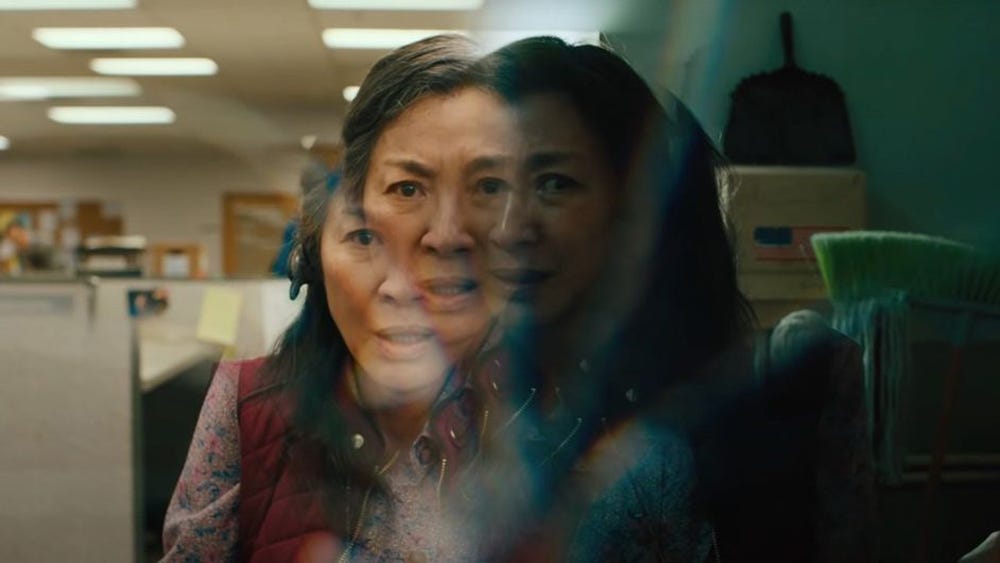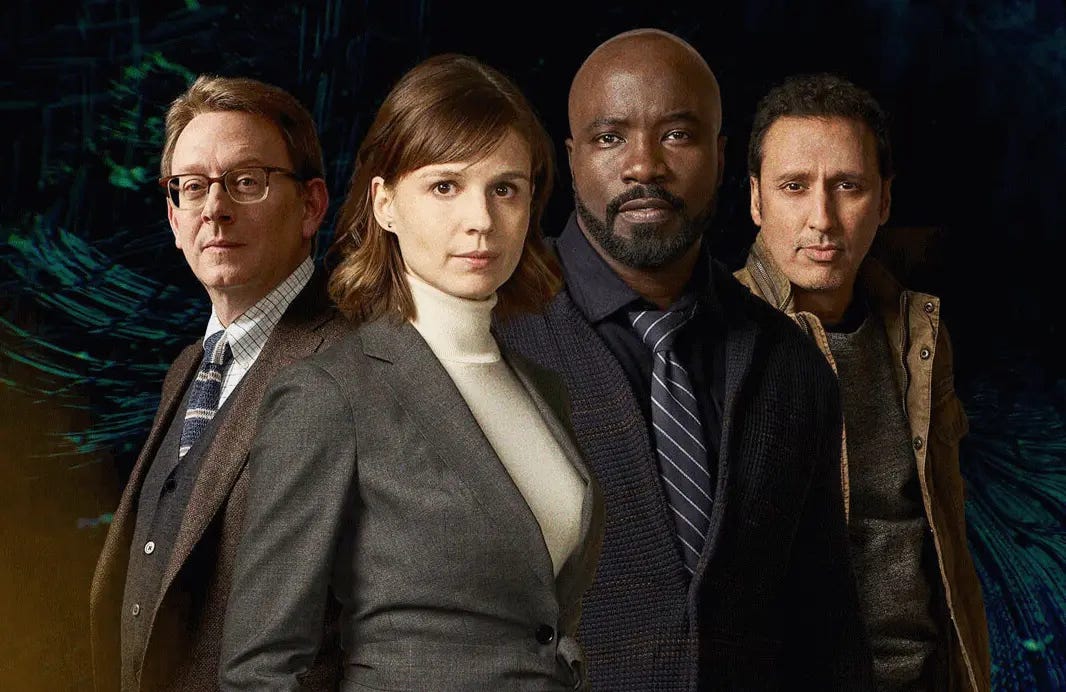8) Storytellers as Mystics? Everything, everywhere, at the same time
Being a Catholic storyteller is a thin red line: it's a stepping up to accept everything, everywhere, all at once, and look for the stories that make sense of it all
Ever feel torn between writing the stories on your heart and meeting everyone’s expectations—too “preachy” for some, not “evangelical” enough for others? I’m Dominic, founder of LegendFiction. If you’re struggling to balance faith, creativity, and the joy of good storytelling, you’re not alone. This isn’t about ‘stuffing doctrine’ into every page or apologizing for your imagination. It’s about finding freedom to write boldly, letting faith inspire without limiting your art. This mini-course Storyteller: How Faith-Inspired Authors Can Find the Freedom to Write the Coolest Fiction in the World shares what it really means to be an author, how to respect your audience, and why your faith is a lifeline to go anywhere and not get lost. Let’s drop the guilt, embrace what’s real, and write stories that matter.
‘Smith of Wooton Major’ is a story of a nobody who lives nowhere (as far as I can tell).
And yet, where he lives is the frontier to elvish realms. As a child, he is gifted a little glowing star, fixed to his forehead like a third eye. An eye full of light.
It is a passport to a life of discovery and adventure, because he can cross over into the Perilous Realm of faery, wander for days without answers, stumble into discoveries and sights most humans have never seen. By the end, Smith has trekked perhaps hundreds of miles, met the Fae queen, and even learned to dance. He returns, trumping home across the British fields like a disciple on the way back from Emmaus, heart afire.
He realizes he is a different person, but can’t say why. What he has seen and touched has deepened and broadened his soul. His soul is formed by more than the systems of this little street, but the regions of elvish realms now live in him.
At the end, he agrees that the point of it all is to learn deep of the land of Fae, and then pass on the gift to a new child.
Storytellers have the same calling.
If we take seriously our vocation as storytellers, then we realize we have been gifted a similar star-brow.
Not everyone has happy adventures. It is a Perilous Realm. But storytellers are the first-responders to the edges of things. Where things break down, like worlds and cultures and peoples, storytellers are the first to the brink to filter, forage, and fuse things back together.
We are more than inventors of stories, we receive them too. We can make up plenty of wish-fulfillment stuff that makes us feel better and pushes our agenda. It happens all the time.
But real storytellers are committed to the human experience, and to reality. And if my tradition and my ideas don’t match up to reality, then they have to change. Because reality is God’s first gospel.
I think storytellers toe a mystic line.
Mystic means ‘direct contact with Divine.’ It doesn’t pass through someone else. It isn’t mediated. We aren’t convinced of it by arguments. It is direct contact.
It is our hand reaching out and touching something reaching back out to us.
Storytellers are here to write, and write them well. To enjoy the journey, to practice getting better. Leave evangelization to the evangelizers. They should leave storytelling to the storytellers.
As fiction authors, we are training ourselves to think more deeply. To pay attention to what it means to be human. To understand what spirit is, what psyche means, what personality can become.
We love our characters from the inside out. We’ve intuited who they are, who they can become. We build storylines to save them, take them through hell and back, because we know that’s the only way they will ever ascend and become fully themselves.
Maybe then we realize that the same experience is happening to us, and to every person.

The better author you become, the better human being you should be.
We dig deeper than most people skimming around on the surface of life, so that we can help them become more themselves.
We learn to study ourselves with the same compassion we turn to our characters. It’s probably the same compassion Christ turns to us from the Cross, where he murmurs, “Father, forgive them, for they know not what they do.”
And let’s not get warm and fuzzy about it all. Left alone, our characters would stay comfortably huddled away in hobbit holes, or stuck in a rut that keeps a constant cycle of pain. Just like you and me.
Your characters have no idea what happens in the next chapter. You do. And so you can be honest and present with every step of their resistance, with their reluctance. You know them from the inside out, and you know what it will take to change their mind.
We need a ton of new stories to help us find ourselves. More stories than you could write in a lifetime.
This is sub-creation.
You’re working with the same cooking materials that God is. Is it any surprise that he’s not worried about your journey, and that he’s going to work with you every step of the way? How the endless abyss of his mercy is beyond human comprehension, and even death doesn’t have the final word?
You so loved your world that you sent your own creativity into it, so that your characters could break out of their living death and rise into life. Sound familiar? I hope so. It’s almost the same thing. Creation and Sub-Creation.
Like the backside of a tapestry, we often see life as glimpses of tangled, twisted threads. Life right now is full of mistakes and grim, gaunt evil things. And we can’t gloss over that. We musn’t. Someone might need your unflinching attention on every step of the human experience, through hell and back, and that might help them live life.
Only Heaven sees the panoramic view from the tapestry front, a cosmic version of the Shroud of Turin, only smiling and alive.
“Embarrassment about the notion of the Catholic writer is like embarrassment at the notion of Catholic universities. The faith is seen as an embarrassment and an impediment. Both attitudes founder on the same fact. Universities were born out of the heart of the Church, and so was our literature. Being a Catholic writer is not a falling away from an ideal; it is the way to fulfill the ideal completely—to see human acts in terms of the ultimate stakes of life. And to engage and amuse the reader in doing so.”
Ralph Mcinerny
Being Catholic is a commitment to all of reality, as it is.
The Catholic storyteller doesn’t seek to create a version of creation that fits our ideas. It’s in the name. Catholic means Universal. The whole universe. All creation. All the galaxies and gods. All the religions and peoples. All the time-travelling mind-bending quantum-connected stuff. And aliens. Somehow it all fits.

Catholicism is possibly the only religion with a name committed to embracing all of reality, on its own terms, oriented toward the ultimate revelation of God himself. We keep getting stuck in politics and nostalgia and addictions, a very normal human thing.
That’s why we turn to storyteller. To step out of it all. To think different. Challenge everything. Write because it matters to you. Write for your audience, your readers. Write with them. Include them on the journey, if you can.
Not everyone wants to be known publicly as a Catholic writer.
I think a bunch of us want our work to stand on its own merits, to be seen as a story and not a Trojan Horse. I think that’s probably smart, especially if you want to stand shoulder-to-shoulder with trending topics.
But however you choose, taking your faith seriously will influence your fiction. You can become a faith-inspired fiction storyteller, where faith and ideals aren’t shoe-horned in afterward, because you have an agenda, but where the story naturally emerges from the experience of wrestling with reality.
And I believe that the practice of being a better storyteller will influence your faith. Exactly as it should. No one is born with a perfect faith. It evolves and grows with experience. And sometimes, like in Silence, we might realize that what we thought was our faith was not. It was our comfort level mixed with the traditions of our time. That’s a hard lesson to learn.
Real faith begins where the stepping stones in the dark end.
Maybe storytellers can get past our delusions a little faster, gain a little of that ‘weight of glory.’ Maybe we can ground ourselves in reality a little more deeply, sip some of that water from the edge of Heaven, and become lighthouses.
We’re in for a ludicrously epic time.
Further up, and further in.
About me: Dominic de Souza
I’m a cradle-Catholic who’s been writing scifi and fantasy novels since I was 13, graduated from the Writer’s Institute for Children’s Literature, and found out I was living in a Catholic doomsday cult. This led to a decade careful rebuilding of what it means to be religious, a book and movie nerd, occasional gamer, and accidental world traveller. Today, I’m a dad, work fulltime in marketing, and build LegendFiction to bring together the coolest storytellers in the world.










